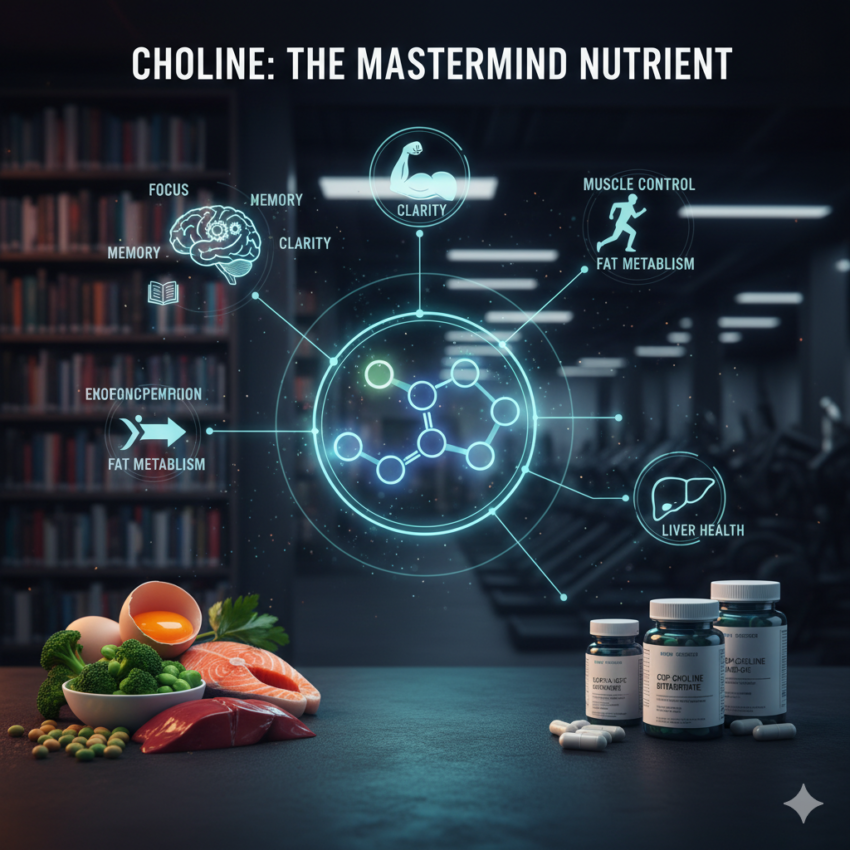Choline the often-unsung hero of nutrition. Essential for everything from sharp focus to powerful muscle contractions, this nutrient is a must-know for anyone looking to optimize their performance in the gym, the office, and beyond.
What is Choline & What Does It Do?
Choline is an essential nutrient that is neither a vitamin nor a mineral, but is often grouped with the B-vitamins due to its similar functions. While the body can produce small amounts in the liver, this production is not enough to meet daily needs, making dietary intake crucial.
Key Functions:
- Neurotransmitter Synthesis (Brain Function): Choline is a precursor to acetylcholine, a critical neurotransmitter. Acetylcholine is vital for:
- Memory and Mood Regulation: Crucial for cognitive function and communication between nerve cells.
- Muscle Control: The chemical messenger between nerves and muscles, essential for movement and coordination.
- Cell Structure and Signaling: It’s needed to form phosphatidylcholine and sphingomyelin, which are fundamental components of cell membranes (the protective barriers surrounding all cells) and the insulating material of brain and nerve tissue.
- Fat & Cholesterol Transport (Liver Health): Choline is vital for liver function, specifically by helping to transport fats (like triglycerides) out of the liver. Without adequate choline, fat can build up, potentially leading to non-alcoholic fatty liver disease (NAFLD).
- Metabolism: It aids in the metabolism of fats and is involved in the conversion of homocysteine (high levels of which are a risk factor for cardiovascular disease) into methionine.
Application in Daily Life & Performance
| Arena | How Choline Helps |
| Study & Work (Cognition) | As a precursor to acetylcholine, sufficient choline intake supports focus, concentration, visual and verbal memory, and overall mental clarity—helping to combat “brain fog.” |
| Everyday Life | Supports healthy liver function, which is critical for detoxication and metabolism. It also contributes to overall cardiovascular health by helping to regulate blood pressure and lipid transport. |
| Gym & Physical Performance | Choline’s role in acetylcholine production directly affects the communication between your brain and muscles, which is key for muscle contraction, control, and endurance. Low levels of acetylcholine can weaken impulse transmission, potentially leading to muscle damage and fatigue. Some preliminary research suggests acute supplementation may help with explosive strength by delaying fatigue. |
What Signals Low Choline? (Deficiency Symptoms)
A true deficiency is uncommon in healthy, non-pregnant adults due to the body’s small production and its presence in many foods. However, insufficient intake can lead to subtle or significant issues.
Signs and symptoms of low choline intake often relate directly to its function:
- Brain Function/Cognitive Changes: Brain fog, memory difficulties, poor concentration, mental fatigue, and unexpected mood changes.
- Liver Health: The earliest and most well-documented clinical sign of deficiency is the development of non-alcoholic fatty liver disease (NAFLD) and elevated liver enzymes.
- Muscle-Related Symptoms: Unexplained muscle weakness, slower exercise recovery, or even muscle damage.
Individuals with high requirements, like pregnant women (due to fetal brain development needs), endurance athletes (who may deplete stores during prolonged activity), or those with certain genetic variations, are at higher risk of inadequate intake.
Excellent Food & Supplement Donors
The best way to get choline is through a balanced diet, as many rich sources also provide other essential nutrients.
Top Food Sources:
- Animal Sources (Highest Concentration):
- Egg Yolks: One of the most concentrated sources (around 147mg per large egg).
- Beef/Chicken Liver: Extremely high in choline (e.g., 3 oz of beef liver has over 350mg).
- Meat, Poultry, and Fish: Beef, chicken, cod, and salmon are excellent sources.
- Plant-Based Sources:
- Legumes: Soybeans (including tofu/tempeh), kidney beans, and lima beans.
- Cruciferous Vegetables: Broccoli, Brussels sprouts, cauliflower, and cabbage.
- Nuts and Seeds: Peanuts and almonds.
Supplements & Dosing Strategies
Choline is available in several supplemental forms, which can have different effects:
| Supplement Form | Common Application | Dosing Strategy (Typical Range) |
| Choline Bitartrate/Chloride | General choline intake, most common in multivitamins. | Usually taken to meet the Adequate Intake (AI) if diet is lacking. |
| CDP-Choline (Citicoline) | Cognitive enhancement (Nootropic). It provides choline plus cytidine (which converts to uridine, supporting brain health). | 500 – 2,000 mg/day, often split into two doses (e.g., morning and afternoon) for sustained focus. |
| Alpha-GPC (L-Alpha-glycerylphosphorylcholine) | Cognitive and physical performance. Highly bioavailable, easily crosses the blood-brain barrier. Often used pre-workout. | 300 – 600 mg taken 30-60 minutes before exercise or a mentally demanding task. |
| Lecithin (as Phosphatidylcholine) | General dietary choline source, often used for fat metabolism/cholesterol support. | Varies widely; often in gram amounts (e.g., 1,200mg – 2,400mg). |
Dosing & Safety
- Adequate Intake (AI): The established guidelines for choline intake are:
- Men (19+ years): 550 mg per day.
- Women (19+ years): 425 mg per day (higher during pregnancy and lactation).
- Tolerable Upper Intake Level (UL): The maximum intake considered safe is 3,500 mg per day for adults. Exceeding this can lead to side effects.
Safety & Side Effects: High doses of choline (often over 3.5 grams) can cause:
- Fishy Body Odor (due to the production of Trimethylamine – TMA).
- Gastrointestinal distress (stomach ache, diarrhea).
- Low blood pressure (hypotension).
Note: Individuals should consult a healthcare professional before starting any new supplement regimen, especially if they have pre-existing health conditions or are taking medications.
